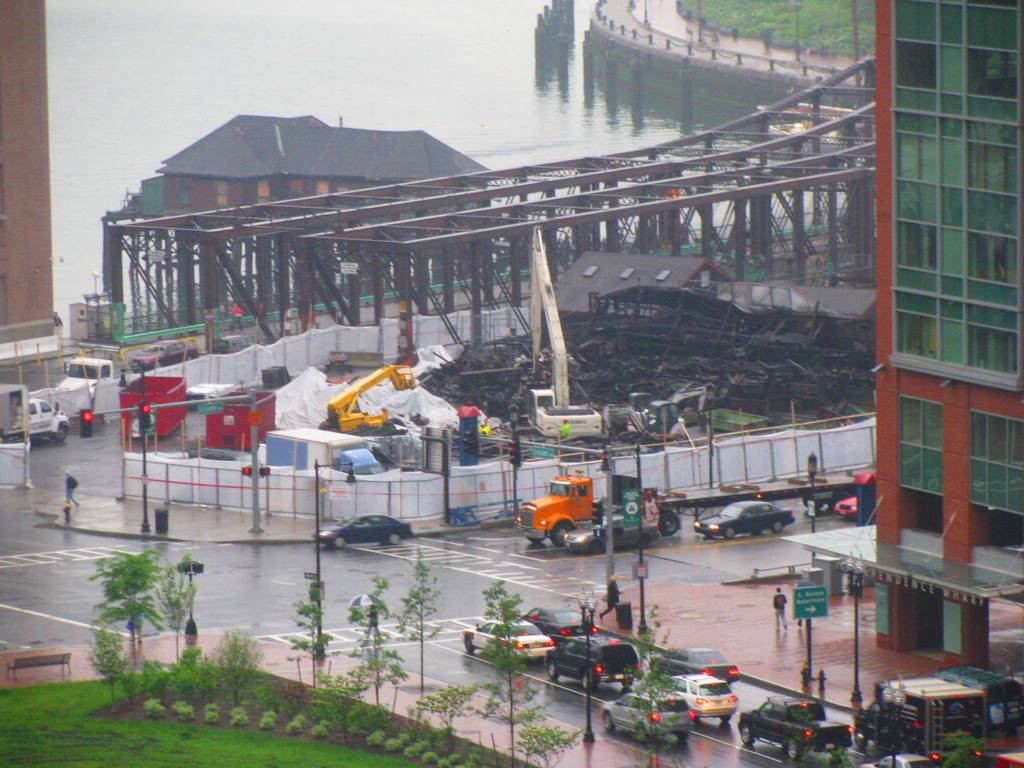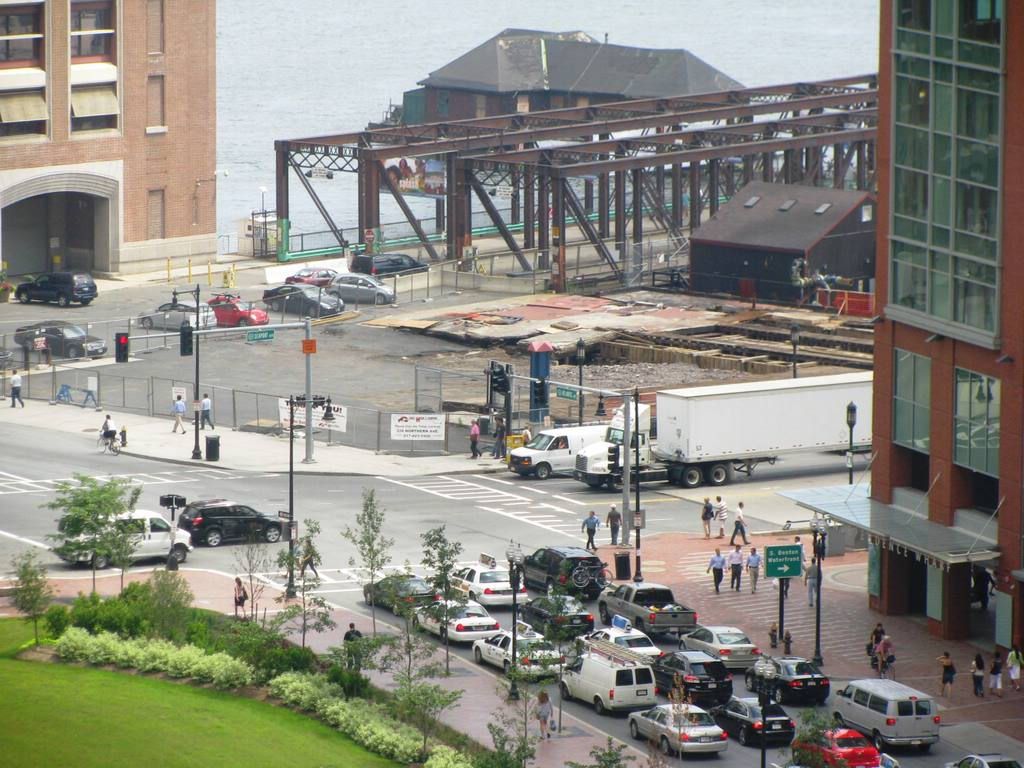7-alarm fire destroys landmark lobster business
James Hook owners vow to return
By Megan Woolhouse and John R. Ellement, Globe Staff | May 31, 2008
Even as swank steel and glass office buildings rose up around it, the squat, wooden James Hook & Co. lobster warehouse remained near Rowes Wharf in downtown Boston, a modest, even grubby reminder of Boston's seafaring soul.
Operated by four successive generations of Hook family members since 1925, the company kept its homespun feel even as it grew to become one of the country's largest lobster distributors. Relatives could often be found serving lobster rolls at the lunch counter, packing lobsters for shipping, or crunching numbers in the office.
The Hook clan gathered in the parking lot of the business yesterday, some in tears. A 7-alarm fire ravaged the business early yesterday morning, destroying a half- million dollars worth of lobster and reducing the landmark to a smoldering heap of charred wood and corrugated metal. The Hook family said yesterday that they have already begun looking at spaces where they could relocate.
Edward Hook II, one of the owners, told reporters that if the business survived the Big Dig, which occurred right outside its front door, it can survive a fire. The hope, they said, was to rebuild where the business has always stood.
"We will set up a trailer, we will set up a tent. I don't know what we are going to do, but we will find a way," he said. "Once this mess is cleaned up, we will find a way."
Fire officials said the cause of the fire was unknown yesterday. Officials estimated the damage at $5 million.
The alarm company that monitors the business alerted the family to the disaster shortly after 3 a.m. Stephen MacDonald a spokesman for the Fire Department, said firefighters at a station just two blocks away from the business learned of the blaze when 911 calls began flooding the dispatch center.
More than 135 firefighters battled the blaze into the daylight, including a scuba team that dove into the harbor and sprayed the rear of the building with seawater for several hours, and a Massachusetts Port Authority fireboat that doused the structure using a powerful pump. The Fire Department's large fireboat could not be used because it is too big to float under the Northern Avenue bridge.
Several Hook family members drove into the city from their homes on the North Shore and found flames leaping from the roof of the business. Hook said he saw smoke as he drove along the Leonard P. Zakim Bunker Hill Memorial Bridge and "knew there was trouble." Employee John Mazurkiewicz, a Hook cousin, said he had tears in his eyes as he walked up Atlantic Avenue and saw flames devouring the place where he had worked since he was 16. He is now 52.
"To see that landmark the way it was is pretty powerful," he said. "You just never think anything like this is going to happen, but when it does, it strikes home."
Cardboard boxes, used by the Hook family to ship lobsters, as well as the creosote-soaked wooden pilings on which part of the business rested, helped fuel the flames. The interior of the business was always moist, if not soaking wet, from the tankloads of lobster housed there, and several family members said they were surprised that the building caught fire. The business housed more than 300 tanks, filled with continuously circulating sea water and able to hold 1,000 pounds of lobster. More than 60,000 pounds of live lobsters - worth more than a half-million dollars - were lost in the blaze.
When asked by reporters yesterday whether he knew how the fire started, Hook answered succinctly: "Not a clue. Not a clue."
The smell of smoke filled the area yesterday, and firefighters and demolition crews drew the attention of joggers and people on their way to work who stopped in their tracks at the sight of the smoldering building. Throughout the day, people snapped photos of the destruction with cellphone cameras.
Hook opened in that location at a time when many lobster shacks and fish houses dotted the Atlantic Avenue shoreline. Since then, most have either shuttered or moved to South Boston, leaving Hook as a last vestige of downtown's maritime past.
Today, many well-dressed people who work in the area spoke wistfully about Hook's lobster rolls. Andrea Ponsetto, a computer analyst at Fidelity Investments, said she visited Hook's every spring to get one with a chips and a soda. She said it was a joy to eat it outside overlooking the harbor.
"It just looks like you'd find it in Maine," she said of the business, "not in a major financial district."
Steve Botchie, who works in South Boston, said he and his extended family had a longstanding tradition of swooping into Hook's to collect seafood - mostly lobster - for a Christmas banquet.
"I think they absolutely" should rebuild, he said. "It's a Boston landmark."
Many appreciated the business's lack of pretentiousness, especially in an area where yachts have come to outnumber fishing boats. The Hook company name was mounted in huge, homemade, white wooden letters nailed to the side of the building. The store's dank interior smelled intensely of seafood. Hook & Co. sold as much as 3 million pounds of lobster in a single year, family members said, much of it caught in Canada, trucked into Boston, and sent worldwide.
Bill Adler, executive director of the Massachusetts Lobstermen's Association, said restaurants in Boston and beyond will probably feel the pinch.
"The Hook company was one of the stalwarts of the distribution system," said "He was one of the big boys."
Hook said he and his son were the last to leave the business on Thursday when they closed the doors about 5 p.m. Nothing was amiss, he said.
"I expected to be here this morning, opening the door and doing business as usual," he said.
Instead, Hook and other family members coordinated demolition crews late into the afternoon and evening. Most family members said they wanted the debris cleared quickly because it was too painful to look at the ruins. Many family members sat on the pavement and watched somberly, including Michael Goto, a 26-year-old fourth-generation Hook family member.
"It's like someone in the family died," he said.
The family has fought off temptations to sell the increasingly valuable piece of land for real estate development, but quickly the talk of Atlantic Avenue became whether Hook would continue to operate on that site, wedged between so many grand office buildings and pricey hotels.
Gimmy Hook, the business's bookkeeper whose grandfather founded the business, said he was in shock. He said the business would reopen, but probably not on the same scale, he said. And its ambiance is irreplaceable.
"This has been a landmark here since 1925. We had so many pictures inside, so many memories," he said. "We'll be back though."






